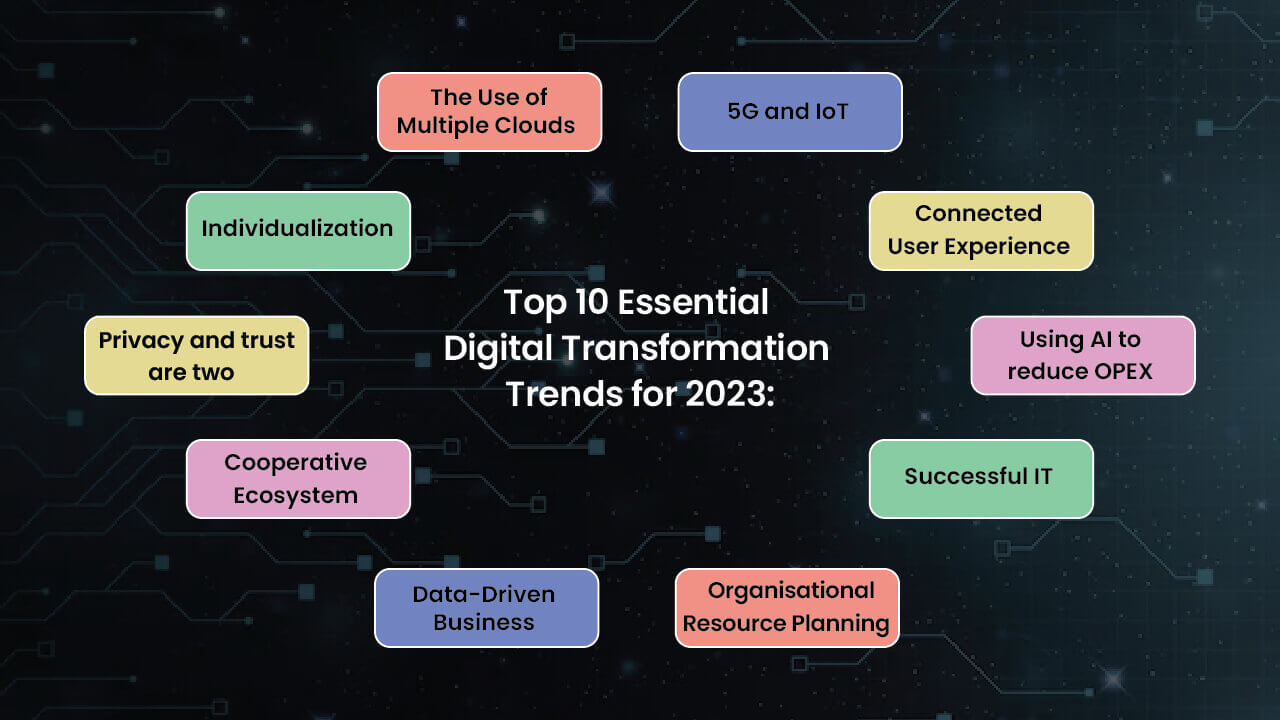
Digital transformation has revolutionized all industries. Meeting evolving consumer demands and seeking top-notch digital experiences are crucial for businesses in this trend. Companies of all sizes have made strategic shifts, with some excelling, others merging, and some facing challenges.
Digital transformation is becoming more and more significant in the constantly changing corporate environment. Focusing on digital initiatives is now an essential component for success, especially in a competitive environment, even though it is occasionally missed owing to conflicting demands.
Significant trends in this sector are revealed by recent Gartner Forecasts insights. According to their research, the worldwide market for hyper-automation technologies would be worth $596.6 billion by 2022.
The greater deployment of automation technology will be a key trend in digital transformation by 2023. Hyper-automation, artificial intelligence (AI), low-code/no-code platforms, cloud-based tools, and other cutting-edge technology will be used effectively to support this. The expansion of businesses and their operations will be greatly aided by these developments.
Certainly! Giving firms a new facelift via digital transformation. It entails utilising cutting-edge tools and cunning tactics to improve processes and increase efficiency. Imagine it as an upgrade from an old automobile to a supercharged one; it aids businesses in keeping up with a rapidly changing environment and satisfies people’s increasing need for easy and thrilling experiences. This transformation isn’t limited to one sector; it’s taking place across all sectors, from healthcare to entertainment, and it’s all about leveraging technology to make things better and more effective.
Absolutely! For firms, digital transformation is akin to a significant update. It entails altering corporate processes and strategies to fit the digital era, as well as utilising innovative technology to develop fresh and improved consumer engagement opportunities.
The new strategy puts clients at the centre of everything, rather than merely emphasising selling and marketing. Plans are currently developed by businesses based on what actual customers want and need.
Online apps that you may use on computers and phones are taking the place of outdated printed papers as part of this transformation. This improves organisation, cleanliness, and benefits the environment.
Data security is a requirement of the digital age. Teams utilise safe online places to store and share information instead of physical documents or spreadsheets. It’s similar to keeping all of your valuables in a secure digital safe that is accessible anytime you need it.
Why should your business implement digital transformation trends now that you are aware of the concept and their function? By taking into account the following considerations, you may better understand why you should be concerned about the digital transition:
Absolutely! Consider this: Businesses too need to stay up with the times, just as we upgrade our tools and gadgets as they become old. Nowadays, everything in our world is digital, therefore businesses must adapt as well. They must switch from antiquated to contemporary practises.
Think about how people used to communicate through handwritten letters or landline phones. But now, with smartphones and instant messaging apps, we can quickly connect with anyone, anywhere. Just like individuals have switched to more convenient and modern ways of communication, businesses also need to switch to modern tools and strategies, like digital transformation, to keep up with the demands of the modern world and stay competitive.
The rising significance of customer happiness in determining a company’s performance highlights the necessity of a strategic approach to digital transformation. Organisations are implementing digital tools and technology to increase productivity, deliver better customer service, and achieve more in today’s fast-paced corporate environment.
A recurring pattern can be seen in how thriving firms have changed through time: they have consistently respected their consumers. With increased competition, it is even more important to place an emphasis on customer satisfaction. Consumers in the modern day are drawn to businesses that put their preferences and needs first.
Businesses may use technology to obtain deeper insights into their target audience in order to stay competitive. Data about clients may be safely kept and retrieved via cloud-based solutions. Then, by utilising this knowledge, one may better comprehend customer behaviors and preferences.
With this information, businesses can exactly match the needs of their clients with the products and services they offer. This degree of personalisation fosters loyalty, improves client pleasure, and promotes successful business outcomes.
In summary, embracing digital transformation involves more than just implementing new technology; it also entails adopting a customer-centric strategy that enables you to better comprehend and cater to your target market. This tactic helps you to deliver outstanding service, streamline processes, and ultimately succeed in a market that is becoming more and more competitive.
Additionally, digital transformation service providers take into account both external connections as well as internal interactions including staff collaboration and communication. Regardless of business models or company size, artificial intelligence may be used to create successful communications inside your organisation.
Digital solutions may be used by businesses to manage their team members and guarantee that each project is finished by the due date. Team members are able to collaborate better and communicate more readily as a result of this.

One of the top studies reveals that the media and entertainment sector is seeing higher spending that results in lower earnings. Operational expenses (OPEX) for the sector are higher than profit margins. In an effort to make quick money or get an advantage over competitors, spending has gotten out of hand. The time has come for the sector to reconsider its approach.
It’s time to review how they manage content and financial resources. And leading the way are artificial intelligence (AI) and machine learning (ML)! You can utilise content and money more wisely by utilising AI and ML approaches.
Now, rather than generating information for the sake of it, the emphasis should ideally be on how it should be used. AI will eventually enable you to reduce OPEX.
Privacy and trust are crucial elements in the journey of digital transformation services that determine the success of an organisation. According to a global survey of more than 4000 businesses and customers, 61% of brands saw a decline in consumer trust as a result of improper data handling. Brands must pay more attention as the gap widens. Government, social media, and traditional media were among the least trusted sectors.
In the future, it will be crucial to keep track of customer data and deliver top-notch user experiences using the data gathered. These efforts are supported by expanding data rules, and more are anticipated in the future. To succeed, businesses must put a high priority on data security and foster customer trust while adjusting to a world where consumer privacy and trust are essential to digital development.
Technology is frequently the first thing that comes to mind when talking about services for digital transformation. This isn’t always the whole story, though. There is more to these services than just technology.
The promotion of a new organisational culture is emphasised by suppliers of digital transformation. It combines people, systems, and technology. Organisations should place a higher priority on constructing intelligent Enterprise Resource Planning (ERP) than just effective media channels for service advertising.
Cost savings, improvements in resource efficiency, and increased production are all possible after implementing ERP. In addition to technological expenditures, focusing on back-office processes is essential for continuous development, producing measurable results and rising profitability. Digital transformation is essentially a comprehensive strategy that integrates technology, culture, and procedures, including the optimisation of ERP systems for long-term success.
The success of organisations’ efforts to undergo digital transformation will be substantially impacted by the personalisation of services in 2023 and beyond. Free and generic material is becoming less prevalent and is being replaced by a more intelligent strategy. Organisations must use personalised techniques to engage customers rather than just pushing stuff to get their attention.
This strategy, known as “smarter personalization,” extends beyond content and need to be present in every engagement a company has with its clients. In the context of digital transformation, this level of personalisation is essential for efficient customer relationship management.
Given these tendencies, it is inevitable that the development of consulting services for digital transformation will change the way that many sectors function. Undoubtedly, the environment of digital transformation services will change significantly in 2023, necessitating the adoption of personalised strategies by businesses.
Customers increasingly expect a smooth experience across numerous channels including texting and mobile portals since the usage of applications within businesses is expanding quickly. Providing a consistent experience is essential for businesses in their digital transformation consulting efforts if they are to live up to this expectation. Customers who enjoy linked experiences across several channels are more likely to stay engaged than those who just use one.
Giving clients improved and quick access at any time and from any location is part of the connected experience. According to surveys, just 29% of an enterprise’s typical 900 apps can give this linked experience. This emphasises how important it is for companies to prioritise and improve their capacity to offer unified and consistent interactions in order to meet current customer needs.
Without a question, data is the driving force behind today’s digital transformation service providers. The potential of data must be unlocked and analysed in order to drive business, streamline processes, and provide new goods and services.
Effective data utilisation is significantly responsible for the efficient transfer of resources and smooth functioning throughout organisations.
Many businesses in the current environment use multi-cloud architectures. However, managing these environments efficiently offers a substantial problem, particularly when moving workloads between clouds. Fortunately, there are workarounds in the shape of containers and API-led development.
The exploitation of various application functions inside multi-cloud setups is made possible through APIs. Additionally, containerization has shown to be an effective method for addressing issues related to multi-cloud environments.
Consider using a multi-cloud strategy for your managed digital transformation services to have a more effective journey. This strategy can produce better results since it takes into account the difficulties in managing various cloud environments while facilitating easier changes and better digital transformation.
The IT department is a key enabler in the contemporary company environment. By making wise choices concerning the integration of cutting-edge technologies, it helps organisations to fully realise the promise of technology. Organisations must broaden their IT skills beyond their existing scope if they want to succeed in the digital world. This growth is crucial for starting a successful transformational digital journey and utilising the advantages that cutting-edge technologies may provide.
Strategic alliances are essential to the success of growing enterprises. Businesses that are successful are creating partner, stakeholder, and customer ecosystems. This network provides seamless product and service integration, resulting in transformational digital consumer experiences.
High data rates, low latency, an enhanced user experience, connection, and increased capacity are all characteristics of the fifth generation of mobile networks, or 5G.
Exciting advancements are made when edge computing and 5G are coupled. In order to improve 5G networks, IBM collaborates with Verizon and Telefonica on cloud services.
In addition, automation from AI, drones, and video inspections will streamline processes and eliminate network problems.
As a result of embracing digital technology, which is referred to as digital business transformation, there is disruption and increased revenue. New trends appear every year, increasing the expansion of businesses. Software monetization, data-driven insights, increased customer happiness, increased agility, and other advantages are some of the main advantages.
Award-winning Veritis offers professional advice for your venture into corporate digital transformation. They guide firms through the implementation of digital transformation successfully.
Wan buffer services thrilled to be part of Odoo Community Days India 2024! Mark your calendars for August 23-24 to engage with industry leaders and discover the latest in Odoo technology and solutions. See you there!